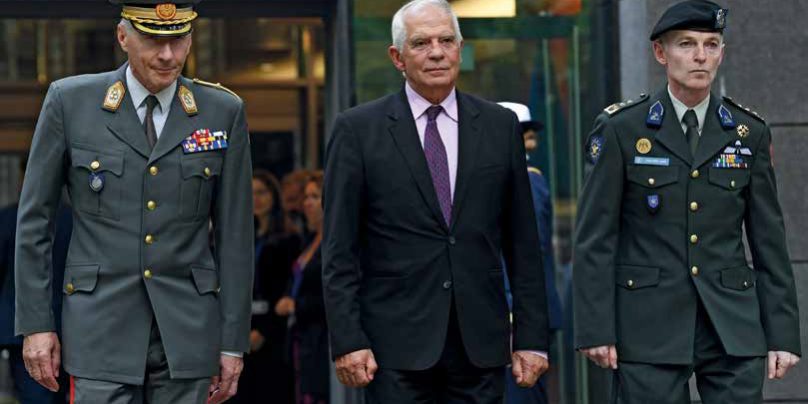by General Robert Brieger, Chairman of the European Union Military Committee (CEUMC), Brussels
The war of attrition between Russia and Ukraine has certainly led to a rethinking of cooperation between the European Union (EU) and the North Atlantic Treaty Organization (NATO). Nevertheless, the main question remains: has this increasingly worrying scenario really brought the EU and NATO closer for good? A cooperation between the EU and NATO is indispensable.
Two bodies – inherently different in nature
One of the dogmas we have to take for granted is that the EU and NATO are and remain inherently different in nature. However, both organisations can complement each other, especially since many allies and EU Member States have started to develop a common threat perception. Therefore, Russia’s invasion logically leads to even deeper EU-NATO cooperation and should put an end to unfruitful and inconclusive debates about European strategic autonomy. Being mindful that there is a single set of forces and that “what is good for the EU, is good for NATO and vice versa”, the EU can in fact make a significant contribution to deterrence and defence. Some projects in the frame of the Permanent and Structured Cooperation (PESCO), for instance, help military forces better prepare for conflict, by making it easier for them to move around in a crisis or collectively develop new capacities. Additionally, the EU has a crucial role to play in enabling defence investment and encouraging EU Member States to cooperate more in defence research, development and procurement, something that the Alliance would also benefit from. The EU is especially well placed to deal with those security issues that do not need a conventional military element – for instance relating to regulations or economic sanctions.
Improving cooperation in complementarity
NATO’s Strategic Concept and the EU’s Strategic Compass talk about strengthening the EU-NATO partnership. The EU policy gives more credit and relevance to the Alliance than NATO’s does with regard to the EU, as a security partner. With 22 and soon 23 out of 27 EU Member States being also NATO Allies, instead of debating on what makes the two organisations different, one should focus on how to improve cooperation in a complementary way. There must also be a coherent cooperation on the question of providing forces and enablers. One has to be very clear here: the increased readiness initiatives of NATO, fully acknowledged by the geopolitical landscape, should not by default “unwillingly” reduce the margins for contributions to EU initiatives. Complementarity and mutual understanding should be taken for granted. This in turn can be seen in the NATO Force Model (NFM) on the one hand and in the EU Rapid Deployment Capacity (EU RDC) on the other. The NATO allies have committed to strengthen and expand the pool of combat-ready forces, including at high readiness as the NFM, as agreed in Madrid 2022. With the EU RDC in the sense of a “single set of forces” and from a complementary perspective, it would mean that in tier one, NATO could make 100,000 operational soldiers ready in 10 days, and more than 200,000 available between 10 and 30 days in tier two.
Being different entities and having different objectives, the EU and NATO must live with and respect their differences. However, the EU covers the spectrum of crisis management as we see it in the Western Balkans, Ukraine and in Africa, especially in the Sahel region. When it comes to collective defence, NATO remains the primary framework for most EU Member States. At the same time, EU-NATO relations shall not prejudice the security and defence policy of those members that are not in NATO. The EU should therefore deepen cooperation with the North Atlantic Alliance in complementarity, synergy, and full respect for the institutional framework, inclusiveness and decision-making autonomy of the two. Nevertheless, both must reorient themselves towards deterring further aggression, while dealing with existing threats and challenges.
Looking out of common solutions
In both entities, at military-to-military level, which has generated the almost pragmatic and viable solutions for many issues, we are often too focused on obstacles where we should look for common solutions, providing our unfettered military advice.
Looking at it from a political and strategic angle, the EU should be the political framework for defining European political and strategic interests. EU-NATO cooperation is then a mechanism for implementing common interests. We therefore have to clearly define what we want and see what we can implement. For this reason, it would be desirable to have a road map in the near future for the implementation of the EU-NATO Joint Declaration. If allies and partners are unable to work together seamlessly, this will inevitably become a force-multiplier for potential adversaries!
The current circumstances remain a historic opportunity for the EU and NATO to join their forces, in full respect of their singularities but with due consideration for their complementarity. The key to the further development of EU-NATO relations at the level of the two institutions lies in the capitals. ■
General Robert Brieger (Austria)
has been the Chairman of the European Union Military Committee since June 2022. Before taking up his current position, he was Chief of Defence of the Austrian armed forces (2018-2021). He served in various positions in the Austrian Ministry of Defence, where he became Director of the Logistics Directorate in 2016 and Chief of Staff in 2017. General Brieger also served as Force Commander of the European Union Forces / Operation Althea in Bosnia and Herzegovina (2011-2012) and was Austrian Contingent Commander of the Kosovo Force (2001-2002).







